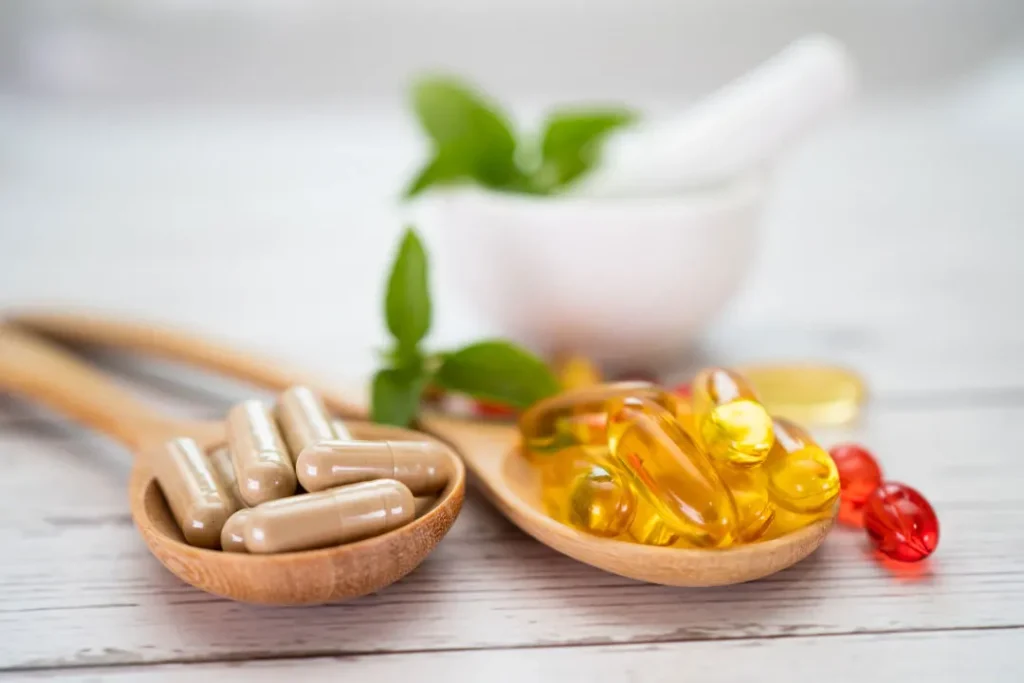Salmon, trout, krill, shrimp, crayfish, crabs, yeast, microalgae, and other aquatic creatures naturally contain the carotenoid pigment, astaxanthin. Astaxanthin is a strong antioxidant that protects the body from oxidative damage. Recently, it has become more well-known as a nootropic supplement because of its propensity to improve cognitive function resulting from its antioxidant properties. This page will discuss astaxanthin’s properties, health advantages, recommended dosage, negative effects, possible drug interactions, and its responsible use for nootropic qualities.
You May Also Like:
Top 5 Nootropic Adderall Alternatives
5 Great Nootropic Herbs for Focus and Mental Clari
Nature of Astaxanthin
Amongst the carotenoids, a vivid red pigment known as astaxanthin is a very strong antioxidant that has the ability to scavenge free radicals and guard cells against oxidative stress. Many aquatic creatures spontaneously manufacture astaxanthin as a coping strategy against oxidative stress brought on by exposure to UV light, heat, and other environmental stresses.
Health Benefits of Astaxanthin
1. Astaxanthin has powerful antioxidant benefits that can scavenge free radicals and shield cells from oxidative stress. Since its antioxidant properties are stronger than other carotenoids like beta-carotene and lutein, it is regarded as one of nature’s most powerful antioxidants.
2. Anti-Inflammatory Effects: Astaxanthin has been proven to have anti-inflammatory effects by suppressing the production of pro-inflammatory cytokines, such as TNF-alpha, IL-1 beta, and IL-6. Moreover, it prevents the NF-B pathway from being activated, which is an important regulator of inflammation.
3. Immune-Modulating Effects: Astaxanthin has been found to enhance the activity of natural killer (NK) cells, T cells, and B cells. This is known as the immune-modulating effects. Moreover, it increases immunoglobulin A (IgA) synthesis, which is important for mucosal immunity.
4. Cardiovascular-Protective Effects: Astaxanthin has been found to improve lipid metabolism, lower oxidative stress, and prevent the development of atherosclerotic plaques, all of which have been linked to cardiovascular protection. It also lowers blood pressure and enhances endothelial function.
5. Cognitive-Enhancing Effects: Human memory and attention have been demonstrated to be improved by astaxanthin, which has been shown to have cognitive-enhancing benefits. By lowering oxidative stress and inflammation in the brain, boosting neurogenesis (the formation of new neurons in the brain), and improving cerebral blood flow, astaxanthin is able to enhance cognitive abilities.

Chemistry of Astaxanthin
The distinct chemical composition of astaxanthin contributes to its pharmacological characteristics. It can absorb light and function as a strong antioxidant thanks to its lengthy conjugated double-bond structure. Due to its chemical composition, astaxanthin can easily pass through cell membranes and interact with intracellular targets.
Physiological Mechanism of Action of Astaxanthin
Many physiological benefits of astaxanthin, including antioxidant, anti-inflammatory, and immune-modulating qualities, have been demonstrated. Although the precise mechanism of astaxanthin’s action is unknown, it is thought to involve the activation of a number of signaling pathways, including the nuclear factor erythroid 2-related factor 2 (Nrf2) pathway, the mitogen-activated protein kinase (MAPK) pathway, and the nuclear factor kappa B (NF-B) pathway. Moreover, oxidative stress and inflammation are regulated by the interactions of astaxanthin with a number of receptors and enzymes, including cyclooxygenase-2 (COX-2), 5-lipoxygenase (5-LOX), and inducible nitric oxide synthase (iNOS).

Optimal Dosage of Astaxanthin
Depending on the person and the desired outcome, different astaxanthin dosages are best. The majority of trials, however, have employed daily dosages between 4 and 12 mg. It is advised to take astaxanthin with meals to improve absorption and lower the possibility of adverse gastrointestinal effects. It’s also crucial to remember that astaxanthin benefits could take a few weeks or months to manifest.
Side Effects of Astaxanthin
When used in accordance with authorized doses, astaxanthin is generally regarded as safe. However, some people may develop gastrointestinal side effects, such as diarrhea and stomach pains. Astaxanthin should be taken cautiously if you are taking certain drugs since it may interact with some of them, including blood thinners and immunosuppressants. Thus, it is crucial for you to speak with a healthcare provider before taking astaxanthin.
Potential Substance Interactions of Astaxanthin
As mentioned, astaxanthin can interact with some medications, including blood thinners and immunosuppressants. Hence, it should be used with caution in patients who are also taking these medications. It’s also important to remember that astaxanthin may interact negatively and reduce the effectiveness of other antioxidants like vitamin C and vitamin E.

Best Responsible Use of Astaxanthin
Selecting a high-quality source of astaxanthin that is prepared to promote absorption and bioavailability is crucial when thinking about the appropriate use of astaxanthin as a dietary supplement to improve general health and also cognition. One of the best sources of astaxanthin on the market is myPEAK Wellness, a supplement prepared by myPEAK Supplements. Its formulation is synergistic and extremely bioavailable. This product is made together with BioPerine®, a patented kind of black pepper extract that has been proven to improve nutrient absorption, and it offers 12 mg of astaxanthin per serving.

Astaxanthin: Conclusion
Astaxanthin is a carotenoid pigment extracted from aquatic animals like salmon, trout, crabs and etc. Astaxanthin can shield the cells from oxidative damage from free radicals. If you are seeking to improve your cognitive ability, myPEAK Wellness with an astaxanthin supplement can help to protect neurons which leads to cognitive improvements. Aside from that, astaxanthin also has great immune-modulating effects. It is recommended to seek advice from medical professionals to know the correct dosage that works for you. Astaxanthin supplements that are sourced from reputable sources such as myPEAK Wellness, bring immense benefits to your overall health and wellness.
Important Note: The information contained in this article is for general informational purposes only, and should not be construed as health or medical advice, nor is it intended to diagnose, prevent, treat, or cure any disease or health condition. Before embarking on any diet, fitness regimen, or program of nutritional supplementation, it is advisable to consult your healthcare professional in order to determine its safety and probable efficacy in terms of your individual state of health.
Regarding Nutritional Supplements Or Other Non-Prescription Health Products: If any nutritional supplements or other non-prescription health products are mentioned in the foregoing article, any claims or statements made about them have not been evaluated by the U.S. Food and Drug Administration, and such nutritional supplements or other health products are not intended to diagnose, treat, cure, or prevent any disease.


